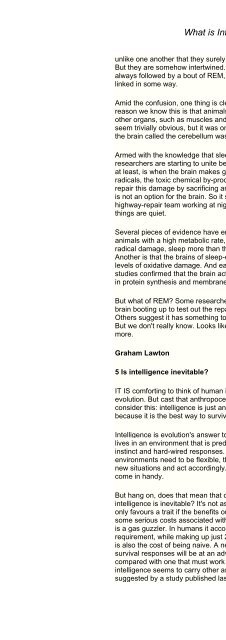07.+What+is+Intelligence+(February+2006) - Get a Free Blog
07.+What+is+Intelligence+(February+2006) - Get a Free Blog
07.+What+is+Intelligence+(February+2006) - Get a Free Blog
You also want an ePaper? Increase the reach of your titles
YUMPU automatically turns print PDFs into web optimized ePapers that Google loves.
What is Intelligence? 129<br />
unlike one another that they surely cannot have the same purpose.<br />
But they are somehow intertwined. In natural sleep, non-REM is<br />
always followed by a bout of REM, so their functions are probably<br />
linked in some way.<br />
Amid the confusion, one thing is clear - sleep is for the brain. One<br />
reason we know this is that animals sleep but plants do not. And<br />
other organs, such as muscles and liver, do not sleep. This might<br />
seem trivially obvious, but it was only this year that a large region of<br />
the brain called the cerebellum was shown to participate in sleep.<br />
Armed with the knowledge that sleep is a whole-brain phenomenon,<br />
researchers are starting to unite behind the idea that non-REM sleep,<br />
at least, is when the brain makes good the damage done by free<br />
radicals, the toxic chemical by-products of metabolism. Other organs<br />
repair this damage by sacrificing and replacing injured cells, but this<br />
is not an option for the brain. So it switches itself off and, like a<br />
highway-repair team working at night, gets on with the job when<br />
things are quiet.<br />
Several pieces of evidence have emerged to back this up. One is that<br />
animals with a high metabolic rate, and hence a faster rate of free<br />
radical damage, sleep more than those with a slow metabolism.<br />
Another is that the brains of sleep-deprived rats suffer unusually high<br />
levels of oxidative damage. And earlier this year gene-expression<br />
studies confirmed that the brain actively switches on genes involved<br />
in protein synthesis and membrane repair during sleep.<br />
But what of REM? Some researchers have proposed that this is the<br />
brain booting up to test out the repairs it made during non-REM.<br />
Others suggest it has something to do with early brain development.<br />
But we don't really know. Looks like we'll have to sleep on it some<br />
more.<br />
Graham Lawton<br />
5 Is intelligence inevitable?<br />
IT IS comforting to think of human intelligence as the pinnacle of<br />
evolution. But cast that anthropocentric snobbery to one side and<br />
consider this: intelligence is just another adaptation. It evolved<br />
because it is the best way to survive in a particular ecological niche.<br />
Intelligence is evolution's answer to unpredictability. If an organism<br />
lives in an environment that is predictable then it can get by on<br />
instinct and hard-wired responses. But animals that live in shifting<br />
environments need to be flexible, they need to be able to weigh up<br />
new situations and act accordingly. That is where intelligence can<br />
come in handy.<br />
But hang on, does that mean that once life appears, the evolution of<br />
intelligence is inevitable? It's not as simple as that. Natural selection<br />
only favours a trait if the benefits outweigh the costs. And there are<br />
some serious costs associated with intelligence. For a start, the brain<br />
is a gas guzzler. In humans it accounts for 20 per cent of our energy<br />
requirement, while making up just 2 per cent of our body mass. There<br />
is also the cost of being naive. A newborn animal with hard-wired<br />
survival responses will be at an advantage in some situations<br />
compared with one that must work out the best way to react. And<br />
intelligence seems to carry other as yet unidentified handicaps, as<br />
suggested by a study published last year showing that fruit flies bred


